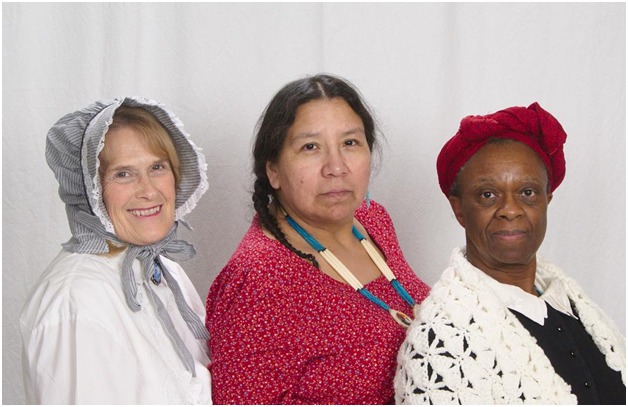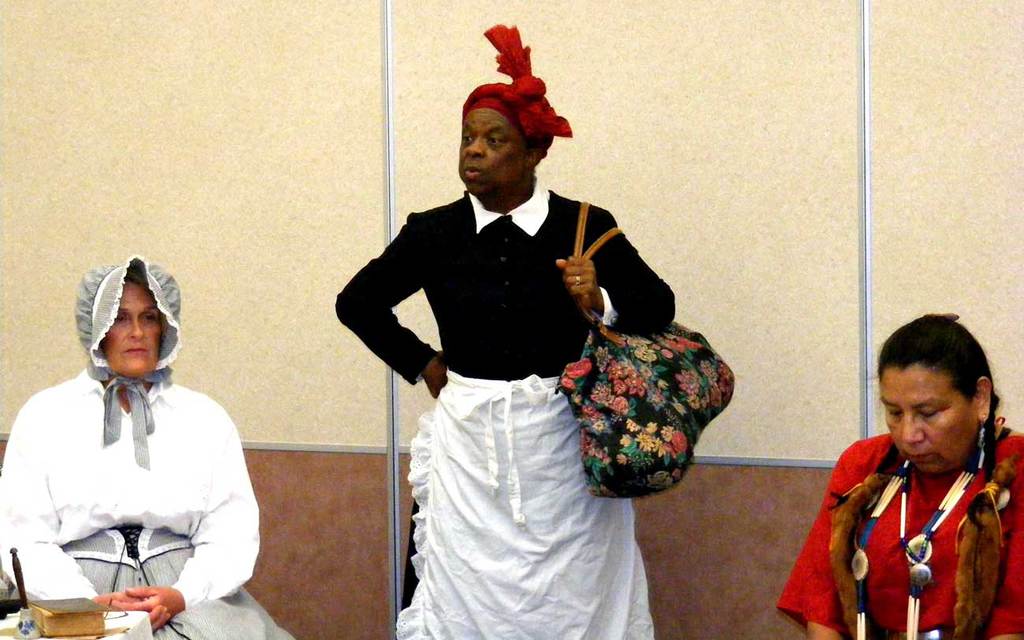CSC graduate portrays pioneer woman

CHADRON – Chadron State College alumna Lillian Derflinger Witt of Gordon, Nebraska, has been sharing her love of history and multiculturalism on stage for more than 10 years through “Dakota Daughters: Wounded Knee 1890, Three Women, Three Lives, Three Cultures.” The other actors are her sister-in-law Geraldine Goes In Center, and Joyce Jefferson.
In the 45-minute program, six scenes present the viewpoints of a Native American, Caucasian, and African American woman set against the historical backdrop of the Homestead Act of 1862, the 1868 Fort Laramie Treaty, the 1876 Battle of the Little Bighorn, and the Dawes Act of 1887.
“We hope when people see the play, they will realize that although we all are unique, such as skin color, cultures, and beliefs, deep down we are not all that different. All of us have hopes, dreams, fears, and struggles. Dakota Daughters' goal is to increase sensitivity and understanding of others, of their customs and their cultures,” Witt said.
Witt said when she was growing up and heard about the happenings at Wounded Knee, it was always called a battle.
“I later learned it most certainly was not a battle, but a massacre,” she said.
Witt majored in journalism at CSC and graduated one course shy of a double major in history.
In 2019, Witt and her colleagues performed the program three times in South Dakota through the South Dakota Humanities Council and five times in Nebraska and North Dakota. They performed twice in 2020 before the coronavirus pandemic started. They plan to perform in September in Brookings, South Dakota.
“I love history and feel it’s important for people to know what happened during that time period. It has been tremendously rewarding for me and I have made some wonderful and lasting friendships along the way,” Witt said.
Witt continually tries to improve her portion of the program by including details from her research.
“For example, I read that baby buffalo can ride on their mothers’ backs when they are crossing rivers so now I sometimes refer to that in my monologue,” Witt said.
Witt first saw the play in 2008 at the Sacred Heart Catholic Church in Pine Ridge. Previously, the program had been known as “Three Voices” and “Three Voices: Speaking from the Past.” Witt joined the group later that year when there was an opening for a Caucasian woman. It was 2010 before her application was formally accepted by the South Dakota Humanities. In 2018, Dakota Daughters invited Kathy Holmgren to moderate the program, and help conduct marketing of the group.
“In creating my character, I chose the name Sadie Babcock. I started with a woman typical of that time. Coming to Dakota Territory from Texas for free land during the Homestead Act of the 1860s, with little understanding of another people, their culture, fears, or struggles. However, over time Sadie comes to realize that they are not all that different from her,” Witt said.
Her character’s husband is Steven, and their children are, Steven Curtis Jr, Carrie, and an infant named Effie in honor of Witt’s paternal grandmother. Effie grows up to have a boyfriend named Russell stationed at Fort Robinson, loosely based on Witt’s paternal grandfather.
Goes In Center is alone on stage when the program begins. Witt enters from the rear and walks down the center aisle to the front of the room. She stands in front of Goes In Center, excited about the wild, open, free land in Dakota. In her jubilation, she sings “Home on the Range.” Third to enter the stage is Jefferson, singing “Free at Last, Free at Last.” After each performance, the three actors host a 15-minute Q&A session with the audience.
Witt’s other programs in the South Dakota Humanities catalog include “Daddies' Dreams,” true stories of her adventurous father. She also performs “Annie Tallent, The First White Woman in the Black Hills.” Tallent is recognized as an interesting figure among the pioneers of the Black Hills, especially in the annals of early educational history.
Category: Campus News, Chadron State Alumni & Foundation, Historical

